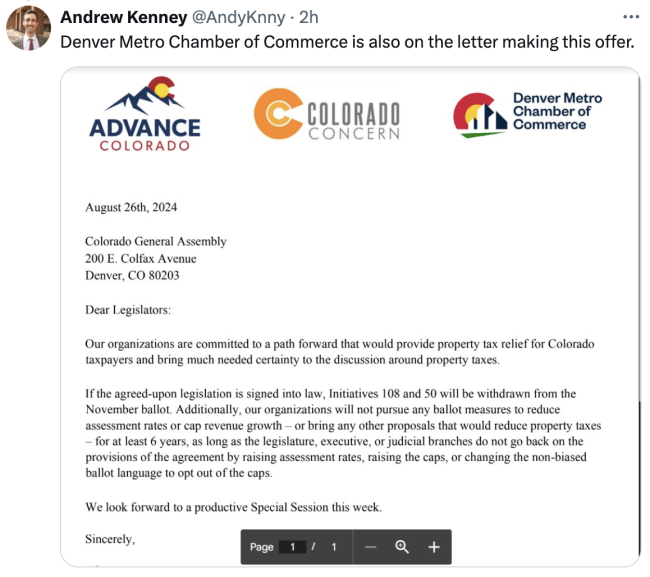 August 26, 2024 02:05 PM UTC
August 26, 2024 02:05 PM UTC
UPDATE: What in the hell is the Denver Metro Chamber of Commerce doing? Take a look at this from CPR’s Andy Kenney:

We weren’t aware that the Denver Metro Chamber of Commerce was involved in the mess known as Initiatives 50 and 108…so why are they getting involved now?

—–
Lawmakers today kicked off the second special legislative session in less than a year to discuss (again) options for reducing property taxes in Colorado. Already, it looks like a deal is largely in place to solve issues related to two asinine ballot measures — Initiatives 50 and 108 — dreamed up by bad actors whose only goal was to justify their own existence to their shadowy funders.
As Andy Kenney of Colorado Public Radio reports via the social media platform formally known as Twitter:

Wow.
THAT’S the deal that Dave Davia of Colorado Concern and Michael Fields of Advance Colorado ended up with after months of property tax bellyaching and hostage taking? What a waste of time and money.
In case you missed the details that led us to this point, here’s a quick primer:

At the end of the regular legislative session in May, lawmakers and Gov. Jared Polis THOUGHT they had a deal in place that would lower property tax rates and prevent right-wingers like Davia and Fields from trying to ram through two ballot measures in the fall that would benefit rich people and screw pretty much everyone else. A bipartisan group of lawmakers worked to pass SB23-233 as a compromise to the demands of Davia and Fields, who together represent a handful of big business interests in the state. A number of influential lawmakers believed that they had a deal with Davia and Fields, only to find out later that their last-minute scramble still wasn’t good enough to stop Initatives 50 and 108 from moving forward.
The two initiatives would do much more than just reduce property tax rates; they would create massive restrictions on how state and local governments budget for important things like firefighters, police officers, schools, and libraries in order to give a fat tax cut to wealthy business interests. A few days after it became clear that Davia and Fields were going to press forward with their ballot measures, in fact, Metro State University President Janine Davidson resigned from the board of Colorado Concern, saying in a letter that she “cannot support actions or positions that put the vitality of our state services at risk, including higher education.” Around the same time, Colorado Concern disappeared a list of board members from its own website.
Initiatives 50 and 108 were so poorly crafted that they didn’t even specify how necessary cuts would really work if the measures passed in November; the proposals basically left it up to elected officials to figure out the problem later. Within a month, municipal bond investors were already threatening to leave Colorado over concerns about how the initiatives would handcuff options for new construction statewide. There were very real concerns that 50 and 108 — if passed in November — would drastically cut funding for fire fighters, police departments, and schools (both K-12 and higher education). This is why Polis agreed to call a special legislative session even though it was unclear that Initiatives 50 and 108 could have passed in November; the risk to Colorado was just too great.
 The fact that Davia and Fields agreed to such a meager deal indicates that they also weren’t all that confident in their measures gaining voter approval. Last week, Advance Colorado’s Kristi Burton Brown (yeah, that KBB) appeared on KOA radio with right-wing talk show host Ross Kaminsky and seemed to give away the fact that they weren’t feeling bullish about the ballot:
The fact that Davia and Fields agreed to such a meager deal indicates that they also weren’t all that confident in their measures gaining voter approval. Last week, Advance Colorado’s Kristi Burton Brown (yeah, that KBB) appeared on KOA radio with right-wing talk show host Ross Kaminsky and seemed to give away the fact that they weren’t feeling bullish about the ballot:
KBB: …to the average voter who’s voting in a presidential election, it’s not 100% clear what this does. And so in order to get past that gap of like the ballot language required by the state, basically to convince people not to vote for cuts and caps, and then the idea that people want to cut and cap, you have to bridge that gap by having millions of dollars to go fund a campaign. I think we can do that. But you also have another side out there that’s going to be raising millions of dollars to fight that. And so that’s where you have the picture of, okay, do we try and get 100% but maybe get 0%, or do we go get two thirds of what we want…
We’re guessing that ten percent is not “two thirds” of what they wanted. The key part of that paragraph, however, is KBB saying “I think we can” on the subject of raising the millions of dollars that would be required to win two statewide campaigns. If Colorado Concern and Advance Colorado didn’t already have the financial commitment from donors to run these campaigns — which is not a huge surprise given the blowback they were already receiving — then they probably weren’t going to be able to put it together with just six weeks to go until ballots drop in Colorado.
According to Kenney, part of the agreement being worked out in the special session is an agreement from CC and Advance Colorado to refrain from pursuing new property tax ballot measures for at least six years. We wouldn’t trust either group to keep that promise after their irresponsible brinksmanship in 2024, which is why lawmakers should consider pursuing a permanent fix to the perpetual problem of a few morons with a checkbook pushing Colorado toward economic collapse.
Subscribe to our monthly newsletter to stay in the loop with regular updates!
Comments